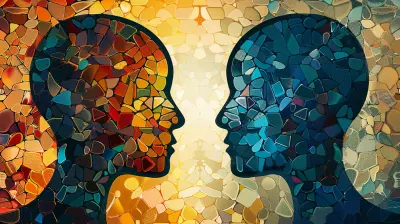The Connection Between Personality Disorders and Eating Disorders
28 July 2025
Let’s be honest. When we hear terms like “personality disorder” or “eating disorder,” most of us think about them as two completely separate issues. One deals with the mind, right? And the other with food? But here's the thing—there’s a significant and tightly woven link between these two. A tangled web, if you will.
If you or someone you care about is struggling with either, understanding this connection can be a total game-changer. It might even shed light on some of the behaviors that never quite made sense before.
So, grab a cup of coffee (or tea), get comfy, and let’s dive into the intriguing, sometimes messy—but always important—relationship between personality disorders and eating disorders.
What Are Personality Disorders?
Before we connect the dots, let’s first unpack what we mean by "personality disorder."A personality disorder is a type of mental health condition that affects how people think, feel, and behave—especially in relation to others. It’s not just about having a few quirks. We all have those. Personality disorders involve long-term patterns that can seriously impact relationships, work, and daily life.
There are 10 recognized personality disorders, and they fall into three clusters:
- Cluster A – Odd or eccentric behavior (e.g., Paranoid, Schizoid)
- Cluster B – Dramatic or emotional (e.g., Borderline, Narcissistic, Antisocial)
- Cluster C – Anxious or fearful (e.g., Avoidant, Dependent, Obsessive-Compulsive)
Most often, when we talk about links to eating disorders, we’re zeroing in on Cluster B and Cluster C.
What Are Eating Disorders?
Alright, flip to the other side of this coin.Eating disorders are mental health conditions marked by unhealthy eating habits. These aren’t just about vanity or wanting to fit into skinny jeans. They’re complex, often deeply rooted in emotional pain, trauma, or mental health struggles.
The most well-known types include:
- Anorexia Nervosa – Extreme restriction of food, intense fear of gaining weight
- Bulimia Nervosa – Binge eating followed by purging
- Binge Eating Disorder (BED) – Frequent episodes of consuming large quantities of food without purging
- ARFID (Avoidant/Restrictive Food Intake Disorder) – Avoidance of food due to sensory issues, fear of choking, or lack of interest
These disorders have serious physical and emotional consequences. People battling them aren’t doing it for attention—they’re often trying to cope with something they can’t explain in words.
So, What’s the Link?
You might be wondering, “Why would someone with a personality disorder be more likely to have an eating disorder?” It's all about how the brain, emotions, and behaviors work together—or sometimes, don’t.Emotional Dysregulation
Picture a pot of water on a hot stove. If the heat keeps rising and there's no lid, the water eventually boils over. That's kind of what happens with emotional dysregulation. People with some personality disorders (especially Borderline Personality Disorder, or BPD) often feel emotions more intensely and have a tough time calming down.Eating behaviors—like bingeing or restricting—can feel like a way to regain control. It’s not healthy, but it’s a coping mechanism.
Low Self-Esteem
Many personality disorders come with a truckload of self-esteem issues. Someone with Avoidant Personality Disorder might constantly fear rejection, while someone with Narcissistic traits might secretly struggle with deep insecurity. When you pair that with societal pressure around appearance, it’s easy to see how that might spiral into an eating disorder.Impulsivity and Control
Some personality types lean heavily into impulsive behavior. That’s common in disorders like BPD or Antisocial Personality Disorder. Those impulsive traits can show up as frequent binge eating or purging.Conversely, over-controlling personalities—like those with Obsessive-Compulsive Personality Disorder—might restrict food to the point of malnutrition.
Different paths, same destination: disordered eating.
The Personality Disorders Most Closely Linked to Eating Disorders
Let’s take a closer look at the personality disorders that most often overlap with eating disorders:1. Borderline Personality Disorder (BPD)
This is the big one. Research shows that 20–80% of those with an eating disorder also meet the criteria for BPD. That’s a whopping number.Why the connection?
- People with BPD tend to have unstable self-images.
- Intense emotional swings can lead to impulsive food behaviors.
- Some use bingeing or purging as a way to self-soothe or punish themselves.
If you've ever felt like food became a weapon in your emotional war, you’re not alone.
2. Obsessive-Compulsive Personality Disorder (OCPD)
Let’s not confuse this with OCD (Obsessive-Compulsive Disorder). OCPD is more about being a perfectionist, needing control, and sticking rigidly to rules.Eating disorders like Anorexia Nervosa are often closely tied to these traits:
- Strict calorie counting
- Only eating at certain times
- Avoiding “bad” foods like they’re poison
The sense of control can feel comforting, especially when emotions are overwhelming.
3. Narcissistic Personality Disorder (NPD)
While less commonly discussed in this context, there’s still a link. Individuals with narcissistic traits may tie their self-worth heavily to physical appearance. This can contribute to disordered eating, especially if there's a fear of losing their "ideal" image.Underneath all the grandiosity, there's often deep vulnerability. Disordered eating becomes a way to protect that fragile core.
4. Avoidant Personality Disorder (AvPD)
Social anxiety and fear of rejection are central to Avoidant Personality Disorder. Eating in front of others, gaining weight, or even participating in social meals can feel terrifying.Disordered eating behaviors may arise from:
- Wanting to avoid attention
- Trying to become “invisible”
- Feeling unworthy of care or nourishment
It's not that they don’t want to eat—it’s that the emotional cost feels too high.
Does One Disorder Cause the Other?
Here’s where it gets a bit tricky. There’s no one-size-fits-all answer.Sometimes, a personality disorder may make someone more vulnerable to developing an eating disorder. Other times, the reverse could be true: battling an eating disorder over years might reinforce personality traits that resemble a disorder.
It’s a bit like the chicken and the egg. Which came first?
Usually, though, they coexist, feeding into each other in a frustrating cycle. The eating disorder might numb emotional pain from the personality disorder, while the personality disorder fuels the behaviors that keep the eating disorder going.
Spotting the Signs of Co-Occurring Disorders
So how do you know if someone is struggling with both?Look for:
- Intense mood swings or unstable relationships
- Perfectionism or need for control alongside strict food rules
- Impulsive behavior like bingeing, substance use, or risky choices
- Deep fear of rejection or abandonment
- Frequent, unexplained health issues related to eating habits
These signs don’t mean someone definitely has both, but they’re red flags worth discussing with a mental health professional.
The Importance of Integrated Treatment
This part’s crucial. Treating an eating disorder on its own—without addressing an underlying personality disorder—is like putting a band-aid on a deep wound. It might help a little, but it won’t get to the root of the issue.Integrated treatment matters because:
- It helps individuals develop healthier coping mechanisms
- It addresses the emotional and behavioral patterns driving the eating disorder
- It reduces the risk of relapse
Therapies like Dialectical Behavior Therapy (DBT) and Cognitive Behavioral Therapy (CBT) often work wonders. And when combined with nutritional counseling and medical support? That’s when real healing begins.
What Can You Do If This Hits Close to Home?
Maybe you see yourself in these words. Or maybe you're thinking about a friend or family member. Either way, here are a few things to keep in mind:- Don’t go it alone – Professional help is key. These are complex conditions that benefit from expert guidance.
- Be gentle with yourself (or others) – These disorders often come from a place of deep emotional pain. Shame and blame only add fuel to the fire.
- Start with small steps – Change doesn’t have to be dramatic to be powerful. Even reaching out for a therapy consult is a huge win.
Remember, recovery isn’t a straight line. It’s more like a winding road, full of U-turns and rough patches—but every step forward counts.
Final Thoughts
The connection between personality disorders and eating disorders is layered, emotional, and incredibly real. It’s not about weakness. It’s about survival. How we learn to cope with life’s storms says a lot about our mental patterns, and sometimes food becomes the life raft—even when it wasn’t meant to.But here’s the good news: with the right support and understanding, people struggling with these co-occurring disorders can heal. The path might not be easy, but it is absolutely possible.
If you or someone you care about is on this journey, know that compassion and treatment can make all the difference. And now that you understand the connection a little better, you're already one step ahead.
all images in this post were generated using AI tools
Category:
Personality DisordersAuthor:

Alexandra Butler
Discussion
rate this article
2 comments
Kassandra Clarke
This article insightfully highlights the intricate relationship between personality disorders and eating disorders. Understanding these connections is crucial for developing comprehensive treatment approaches that address both psychological and behavioral aspects of these complex issues. Great read!
December 10, 2025 at 6:06 PM

Alexandra Butler
Thank you so much for your thoughtful feedback! I'm glad you found the article insightful and that it emphasized the importance of understanding these connections in treatment.
Ariadne Cook
This article brilliantly highlights the complex relationship between personality and eating disorders. Understanding these connections is key to fostering compassion and effective treatment. Great insights!
August 3, 2025 at 4:42 AM

Alexandra Butler
Thank you for your thoughtful comment! I'm glad you found the insights valuable. Understanding these connections is indeed crucial for fostering compassion and effective treatment.


